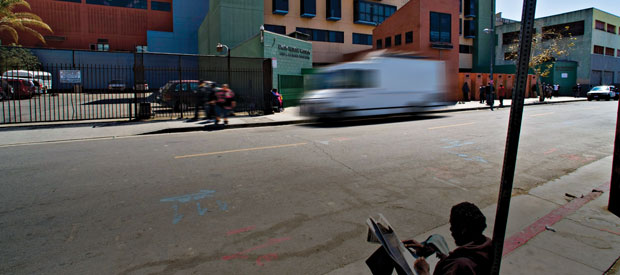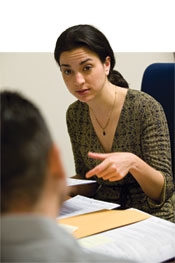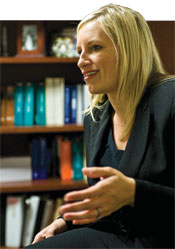Everyone Deserves an Advocate
Homelessness is becoming a cruel reality for more and more people in America, a hub of financial hardship amidst the global economic downturn.
How far away are you from homelessness?

A pink slip? A mortgage payment?
A few burned bridges with family members?
Homelessness is becoming a cruel reality for more and more people in America, a hub of financial hardship amidst the global economic downturn.
The Union Rescue Mission, located in the heart of Skid Row in downtown Los Angeles, is the largest mission of its kind in the United States, dedicated to serving the poor and homeless. Tent-enclosed cots fill every inch of open space in the massive facility. The tiny, temporary homes are called EDARs, which stands for “everyone deserves a roof.” The mission has seen a 400 percent increase in residents since last year—people who have watched their comfortable lives crumble around them and have nowhere else to turn.
 “In the first month of winter, the shelter had as many people come as they had in
all of 2008,” says Brittany Stringfellow-Otey (JD ’01), poking her head into the mission’s
chapel. “They normally sleep 600 in the building. Lately, it’s been more like 1,000.”
“In the first month of winter, the shelter had as many people come as they had in
all of 2008,” says Brittany Stringfellow-Otey (JD ’01), poking her head into the mission’s
chapel. “They normally sleep 600 in the building. Lately, it’s been more like 1,000.”
Stringfellow-Otey is the director of the Pepperdine Legal Aid Clinic, which the School of Law established at the Union Rescue Mission in 1999 and has since become an essential component of the rehabilitation programs on-site. Stringfellow-Otey and her staff of students believe that, in addition to a roof, everyone deserves an advocate. Homeless men and women often need legal services to overcome their past and reenter their communities as productive, upstanding contributors.
Second-year law student Weston Krider has worked in the Legal Aid Clinic both semesters this year. He describes the work he’s doing as “eye-opening.” “Coming in, I had very little experience with the homeless,” he says. “I had the perception that I think a lot of people have—that they just don’t care about their plight in life and they choose to fly under the radar.”
Krider says he was surprised to find that the people he’s met, for the most part, are not that different from him. “The people that I work with really do care. They’re trying, but sometimes the circumstances are impossible. They got a conviction, or they start racking up debt, and it’s tough to get out. They need help.”
Students who work at the Legal Aid Clinic receive class credit to do legal work that changes people’s lives. They write motions and represent clients in a forum called “homeless court,” a collaboration between the public defender, the city attorney, and social service agencies. They complete expungements, getting clients’ criminal histories dismissed in order to aid them in the job application process. They also assist with parentage, custody, visitation, and child-support matters.
With the influx of residents, providing everyone with an advocate has become an increasing challenge. The clinic has responded by holding monthly expungement workshops on top of their normal caseload to service as many people as possible, all in a one-stop shop. “We’ve had up to 50 and 60 people come from all over Southern California—as far as Lancaster and the Inland Empire,” Stringfellow-Otey says. “Often they are people who still have homes but have recently been laid off. Laws have changed about criminal backgrounds, and so they are trying to get back into the workforce.
Students of the Pepperdine Graduate School of Education and Psychology also offer services to the homeless community at the Los Angeles Union Rescue Mission through a counseling clinic established in 2001. Clinic services, provided at no cost to homeless and poor persons, include individual and group therapy, psychological assessment, and psychoeducational programs.
Learn more: magazine.pepperdine.edu/union-rescue-mission
In addition to their weekly field work, students undergo seven weeks of training in a classroom course designed to prepare them for the situations and poverty they will face.
“I walk them through the things to expect,” explains Stringfellow-Otey. “It starts from even just parking in that area—we park below the building, in a secure lot. Then, let’s talk about what biases we bring to the table. What’s the scariest case that you can imagine coming across your desk? Because it will come.”
In addition to financial struggles, some clients have lengthy rap sheets, with everything from attempted murder to pedophilia to prostitution. “I ask, ‘What is the thing that’s going to make you tighten up in your throat?’ Because our goal is to walk you through that,” she says.
One of the biggest lessons that the students have to learn is to set boundaries. “When you first come in and have contact with this much need, there’s a part of you that just wants to give all of yourself to try to heal it,” she says. “That’s great, but if you give too much of yourself you’ll actually wear out too quickly and then you won’t be able to help long-term.”
The key, Stringfellow-Otey says, is for students to understand that they can’t help people who don’t want to help themselves. “I’ve worked all weekend on a motion to get a woman’s children back, cried over it, gotten up at 4 a.m. to work on it, only to come to work on Monday morning and get a voice mail from her that she’s decided to go back to prostitution and she doesn’t want her kids back,” she says. “If I want a particular resolution more than the client does, then I have crossed my own boundary that I have made for myself.”

“If I want a particular resolution more than the client does, then I have crossed my own boundary that I have made for myself.”—Brittany Stringfellow-Otey
On a practical level, students learn how to deal with a wide variety of personalities, how to manage their time and their caseload, how to appear confident when their mind is racing, and how to communicate complex ideas clearly. “Students have to find a balance between compassion and professionalism here,” Stringfellow-Otey says. “They walk alongside the client, helping them to navigate the legal system. They also empower the client to take matters into their own hands, so that they know how to take the next step.The ideal result is growth on the part of both the client and the student.”
The Legal Aid Clinic began as the product of several discussions in professor Bob Cochran’s “Christ and the Law” class. From that class, a student-led movement grew. As a first-year law student, Stringfellow-Otey got involved. “We would come down to the mission with Pepperdine professors and have them supervise us, and we would interview clients and then go back to school and try to figure out the answers to their problems. Then we’d come back the next week and give them our advice. So, it started out very small and really grassroots,” she says.
Arriving at the mission, she says she found her calling. “I felt pretty lost in law school because I just couldn’t connect that heart and mind thing. But the first time I walked on this floor—the sights, the smells, the sounds—it all collided and I thought, this is what I was made for.”
Now, she’s the one guiding students down that hall. “I think for a lot of students, it starts with just wanting some handson, practical experience,” she says. “My hope is that any student who comes to this clinic is never the same, that they’re changed. And that as they transition to their firm or whatever it is they go to do, they will always be mindful of the poor.“
One client who has left an indelible mark on students is a woman named Guadalupe Cortez, who escaped domestic violence in Mexico to bring her four children to the United States. “I came to this country with the dream of finding a better life for my family,” she says. The only job she could find was in a clothing factory where they paid her 10 cents per piece of clothing she sewed. “I had very hard time finding a babysitter for my children and paying my bills.”
After five years of struggling, she decided that she would try to provide her children a better life by giving them up for adoption. “That was the most difficult decision of my life, but no mother in her right mind would ever want to see her children suffer because life is so demanding and hard. I will give my life for my children; my love goes with them always,” she says.
Cortez hopped from shelter to shelter and devoted herself to learning English, while studying to be a domestic violence counselor and saving money. Eventually one of her daughters was permitted by the adoptive family to return to live with her, if she could do the legal footwork.
“I didn’t know or understand the law and my rights when it comes to my children,” Cortez says, explaining that she heard about the Union Rescue Mission’s Legal Aid Clinic from a case manager. “I knew within my heart that God was with me all the time and had sent me there to find help,” she says.
In order for Cortez to get parental rights, the students had to prove to the judge that she had a safe place for her daughter to live. She found an apartment while the students got to work raising funds to help her furnish it. After a shopping trip to IKEA, the students made their case in court. Now Cortez has not only a home to call her own, she has full custody of her daughter. “I am so thankful to God for their help,” says Cortez, who now works at the Union Rescue Mission as a dorm intake assistant.
For the students experiences like reuniting a mother with her child are not only life-altering, they are career-building.
Second-year law student Molly McKibben, for instance, saw a client several months ago who brought a friend with him to his appointment: a baby pigeon. “He fed the bird, and let the bird waddle around on my desk during the appointment. It was memorable to say the least,” she says. A week later McKibben was at an interview with a firm in Santa Monica, California. The interviewer asked how her work at the Legal Aid Clinic might prepare her for working at his firm, how the skills might transfer.
Without skipping a beat McKibben replied: “You mentioned that things move at a fast pace here, and that I will need to multitask and take whatever lands on my desk. I wrote a motion with a pigeon hopping around on my desk last week. I can do anything.”
